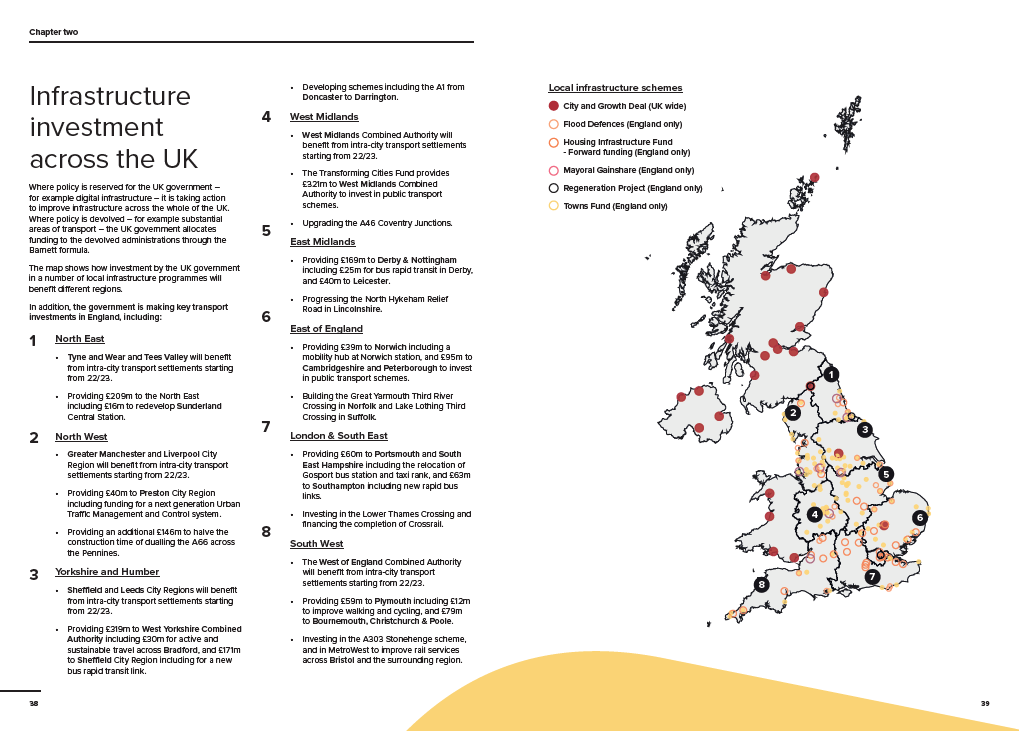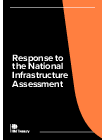£4.8 billion Levelling Up Fund will be extended to the whole of the UK to help boost growth in Scotland, Wales and Northern Ireland

@HMTreasury Chief Secretary is clear that #LevellingUp means every region and nation of the UK
£4.8 billion will now be invested in local projects, such as regeneration and transport, ensuring the government provides the same support to communities across the UK as we build back better from Covid.
A multibillion-pound fund to level-up opportunities is being extended so that people in every region and nation of the UK can benefit, it was announced today (24 Feb). Taking this UK-wide approach makes sure that the UK Government can target funding more efficiently and responsibly between different parts of the country.
Chief Secretary to the Treasury, Stephen Barclay, said that communities in Scotland, Wales and Northern Ireland will now all benefit from at least £800 million of investment by the UK Government for town centre and high street regeneration, local transport, cultural and heritage projects.
The Levelling Up Fund, which was announced at the 2020 Spending Review, will invest in local infrastructure that has a visible impact on people and their communities. It will run from 2021/22 to 2024/25, and drive regeneration in places in need, those facing particular challenges, and areas that have received less government investment in recent years. Because such places exist across the UK – including in Scotland, Wales and Northern Ireland – this support is being extended across the whole of the United Kingdom.
The initial £4 billion will now be made £4.8 billion as the scheme becomes UK-wide. Making the Levelling Up Fund UK-wide will enable the government to provide the same support to communities in all parts of the UK as we build back better from Covid.
Chief Secretary to the Treasury, Steve Barclay, said:
“We are committed to levelling-up opportunities right across the United Kingdom so that all communities can benefit from our future prosperity.
“Our levelling-up fund will back local projects to improve everyday life for millions of people and we look forward to working with all areas to boost local economies.
“By extending the levelling-up fund to be UK-wide, we are ensuring that no community in the United Kingdom is left behind.”
All parts of the UK have benefited from the UK government’s £280 billion economic support package which has protected millions of jobs throughout the pandemic through the furlough scheme, self-employed support and generous business loans. The response to the pandemic has shown that the UK government has successfully saved jobs and protected people throughout the UK.
Making the Levelling Up Fund UK-wide will enable the government to provide the same support to communities in all parts of the UK as we build back better from Covid and to take a strategic approach across the whole of the UK, allocating funding in all parts of the country irrespective of administrative borders. Along with the government’s plans for the UK Shared Prosperity Fund, the Levelling Up Fund will ensure a package of UK Government support which invests in skills, infrastructure and innovation at local, regional and national levels.
Scottish Secretary, Alister Jack, said:
“The new UK Levelling Up Fund is a fantastic example of the UK Government delivering for people in Scotland. It will provide a boost to communities right across Scotland as we set out to Build Back Better from the Covid pandemic.
“This fund will allow us to directly invest in capital projects in Scotland. I look forward to working on the delivery of the fund in Scotland and with local authorities, who know best what their communities really need.
“The new UK Levelling Up Fund is just one way the UK Government is investing in Scottish jobs and Scotland’s future prosperity. We are driving a package of measures to level up opportunity across all parts of the UK, including City and Region Growth Deals, Freeports, the Union Connectivity Review, and preparing for a new UK Shared Prosperity Fund.”
Welsh Secretary, Simon Hart, said:
“This represents a significant investment in Wales and is testament to our determination to level up the whole of the UK.
“The UK Government has supported hundreds of thousands of people and businesses in Wales through the pandemic. As we begin our programme to build back better we will target investment where it is needed most, directly benefitting communities across Wales.”
Further details on how the Fund will operate will be published in the prospectus at Budget – including who can bid, the types of projects eligible for funding, and the criteria for assessing proposals.
The UK Government will use the financial assistance power in the UK Internal Market Act to ensure the fund is UK-wide. Due to this, the initial £4 billion fund will now be made £4.8 billion available UK-wide.
The Levelling Up Fund will supersede existing local growth funding streams, such as the Local Growth Fund, Pinch Points Fund, and future rounds of the Towns Fund – working directly with local areas across the UK to take a holistic approach to their needs.
Since 2015, the UK government has invested billions in local growth funding including:
- Committing to 20 City and Growth Deals covering the whole of Scotland, Wales and Northern Ireland. These ensure that all individuals can benefit from nearly £2.9 billion of direct UK government investment.
- Agreement of nine mayoral devolution deals for city-regions across the country, representing £7.5 billion of un-ringfenced ‘gainshare’ investment over 30 years for Mayoral Combined Authorities to invest in local priorities.
- Up to £600 million of investment over 20 years through the West Yorkshire plus Transport Fund, agreed as part of the 2014 Leeds City Region Growth Deal, as well as up to £500 million over 15-20 years for the Greater Cambridge Partnership, agreed as part of the Greater Cambridge City Deal.
2020 SPENDING REVIEW FACTSHEET: LEVELLING UP
Supporting jobs and investment in local areas, helping people feel better off, by:
- supporting millions of jobs and businesses across every corner of the UK through the COVID-19 support schemes
- setting out a National Infrastructure Strategy to increase transport and digital connectivity across the UK
- setting up a new infrastructure bank to catalyse private investment in infrastructure projects across the UK
- setting out £100bn of capital investment next year to boost growth across the UK:
What is the National Infrastructure Strategy?
- The National Infrastructure Strategy (NIS) sets out the government’s plans to transform UK infrastructure, boosting transport and digital connectivity, based around three central objectives: economic recovery from Covid-19; levelling up and strengthening the Union; meeting the UK’s Net Zero Emissions target by 2050
- The government will spend £27bn in 2021-22 on economic infrastructure, as part of the £100bn of capital investment.
- Some of the measures being announced include
- A major new national infrastructure bank based in the north of England;
- Long-term transport funding settlements for northern cities;
- A new Levelling Up Fund worth £4 billion for England to invest in local infrastructure
- £1.3bn to support vital new technologies: carbon capture and storage and hydrogen;
- £1.9bn for electric vehicle charging infrastructure and grants for zero and ultra-low emissions vehicles, coupled with a commitment to end the sale of new petrol and diesel vehicles by 2030;
- £5.2bn flood defence funding to protect 336,000 homes;
- Landmark reform of the planning system to make it easier to build social infrastructure.
What is a UK infrastructure bank?
- The bank will support infrastructure projects across the UK.
- It will focus on i) economic growth ii) levelling up iii) transitioning to Net Zero.
- It will be operational in an interim form from spring 2021.
- The bank will co-invest alongside private sector investors, using loans, guarantees, equity and hybrid products.
- It will be headquartered in the north of England and operate UK-wide.
- Able to lend and offer advisory support to local and mayoral authorities for key regional infrastructure projects.
- It will replace some of the activities of the European Investment Bank (EIB) but provide more targeted support for UK projects.
Changing the way that government delivers for local areas by:
- Reforming the Green Book to better link projects and programmes to government objectives so that only proposals that meet them are short listed and improving the understanding of impacts of proposals on places.
- Ensuring that public spending across government is focused on delivering priority outcomes for citizens, such as raising productivity and empowering places so everyone can benefit from levelling up.
- We have put this into practice by assessing all decisions made at SR in line with these priority outcomes, including investment in the Transforming Cities Fund, the UK Shared Prosperity Fund and selections for the Government’s High Potential Opportunities Programme.
- Relocating 22,000 civil service roles out of London and the South East by 2030 in order to ensure civil servants reflect the communities they serve.
Helping towns and cities to thrive by:
- Setting out how the UK Shared Prosperity Fund will help to level up and create opportunity for people and places across the UK; and providing £220 million additional funding to help local areas prepare over 2021-22 for introduction of the new Fund.
- A new Levelling Up Fund worth £4bn for England to invest in local infrastructure that has a visible impact on people and their communities and will support economic recovery
- Investing in local transport like roads, buses, and cycling
What is the Levelling Up Fund?
- The government is launching a new Levelling Up Fund worth £4bn for England,
- This will invest in local infrastructure that has a visible impact on people and their communities and will support economic recovery.
- This new cross-departmental Fund for England will invest in a broad range of high value local projects up to £20 million, or more by exception, including bypasses and other local road schemes, bus lanes, railway station upgrades, regenerating eyesores, upgrading town centres and community infrastructure, and local arts and culture.
- It will be open to all areas in England and prioritise bids to drive growth and regeneration in places in need, those facing particular challenges, and in areas that have received less government investment in recent years.
- The SR makes available up to £600m in 2021-22. We will publish a prospectus for the fund and launch the first round of competitions in the New Year.
What is the UK Shared Prosperity Fund?
- The UK Shared Prosperity Fund will help to level up and create opportunity across the UK for people and places.
- It will operate UK-wide, using the new financial assistance powers in the UK Internal Market Bill.
- Funding will ramp up so that total domestic UK-wide funding will at least match EU receipts, on average reaching around £1.5 billion a year. In addition, to help local areas prepare over 21/22 for introduction of the UKSPF, we will provide additional UK funding to support our communities to pilot programmes and new approaches.
- A portion of the Fund will target places most in need across the UK, such as ex-industrial areas, deprived towns and rural and coastal communities. This will prioritise investment in people and skills tailored to local needs, investment in communities and place, and investment for local business.
- A second portion of the Fund will be targeted differently to people most in need through bespoke employment and skills programmes.
- The Spending Review sets out the main strategic elements of the UKSPF in the Heads of Terms. The government will set out further details in a UK-wide investment framework in the spring and confirm multiyear funding profiles at the next Spending Review.
This is a long-term ongoing priority and we will continue to revisit it at every future Budget and Spending Review until we deliver on this promise.
The National Infrastructure Strategy sets out plans to transform UK infrastructure in order to level up the country, strengthen the Union and achieve net zero emissions by 2050.
Documents

National Infrastructure Strategy (web)
Ref: CP 329PDF, 11.9MB, 100 pages
National Infrastructure Strategy (print)
Ref: CP 329PDF, 62.8MB, 51 pages
Response to the National Infrastructure Assessment
PDF, 665KB, 48 pages
PDF, 199KB, 10 pages
Response to the Regulation Study: Strategic Investment and Public Confidence
PDF, 269KB, 11 pages
NIC Greenhouse Gas Removal Technologies Study: Terms of Reference
HTML
Details
The National Infrastructure Strategy sets out the government’s plans to transform the UK’s infrastructure networks. It is based around three central objectives: economic recovery; levelling up and strengthening the Union; and meeting the UK’s net zero emissions target by 2050. This will be enabled by clear support for private investment and through a comprehensive set of reforms to the way infrastructure is delivered.














Responses